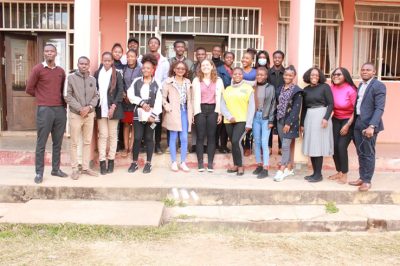Helping to create an evidence map for nutrition research in Zambia
The United States Agency for International Development (USAID)-funded Scaling Up Nutrition Learning & Evaluation (SUN LE) program, through the University of North Carolina at Chapel Hill (UNC) and the University of Zambia (UNZA), has created an evidence map of nutrition research conducted in Zambia.
An evidence map is an interactive tool that provides a visual summary of existing evidence. Evidence maps can help policymakers and program implementers make evidence-informed decisions by providing an easy way to review existing data. They can also be used to help avoid duplication of research efforts and direct research resources to where they are needed most. Utilizing evidence to inform nutrition policies and programs can improve nutrition outcomes.
SUN LE conducted a systematic scoping review of the research and literature to develop the Zambia Nutrition Evidence Gap Map. Seven faculty, librarians, and students from UNC and a SUN LE consortium member worked alongside 13 faculty and graduate students from UNZA to develop the evidence map.
“The whole process of working together in a collaborative manner to facilitate informed judgment and evidence-based decision making in development policy and practice was a great experience,” said Tulani Francis L. Matenga, MPH, Research Fellow Center for Infectious Disease Research in Zambia (CIDRZ)/University of Zambia, School of Public Health-Department of Health Promotion and Education
The team searched four bibliographic databases (PubMed, Global Index Medicus, Global Health, and Scopus), screened more than 2,500 abstracts and identified more than 500 articles and reports describing nutrition-specific and nutrition-sensitive research in Zambia. UNC provided training to the UNZA team in systematic reviews, evidence gap maps, Covidence online software and hosted webinars on data visualization and Tableau software for NFNC and other nutrition stakeholders in Zambia.

Photo of Mia Haller MPH ’23 and Gillings Zambia Hub fellow with the UNZA team in 2022.
SUN LE created an evidence map that visually summarizes the categories of nutrition research conducted in Zambia. The most common research type has been observational studies examining factors influencing child growth, nutritional status and infant feeding practices. While less common, there have been intervention studies on the impact of interventions to improve feeding practices and nutritional status. The evidence map provides an easy way to see all the nutrition research conducted in Zambia by nutrition topic, which allows users to quickly identify relevant research and areas needing more research.
The evidence gap was recently approved by USAID and published on the National Food and Nutrition Commission website, where it is publicly accessible. Professionals working in nutrition and nutrition-related fields – health, agriculture, water and sanitation, social protection, education, fisheries and livestock – among others, will be able to access it to find and use existing evidence to make decisions. Further, the evidence map will help direct research resources where they are needed most. The trained local experts will continue to develop similar tools in their respective institutions and are willing to coach and provide mentorship to others interested in developing similar tools.
